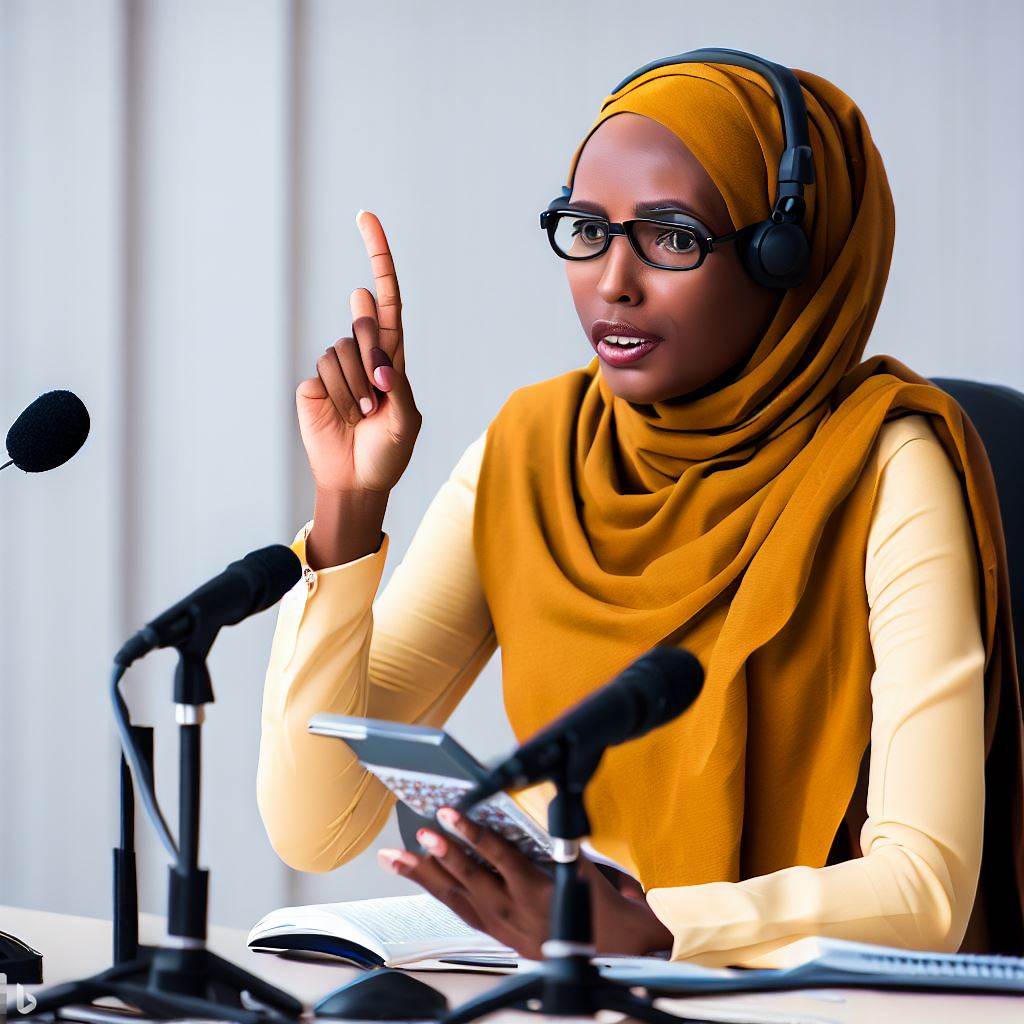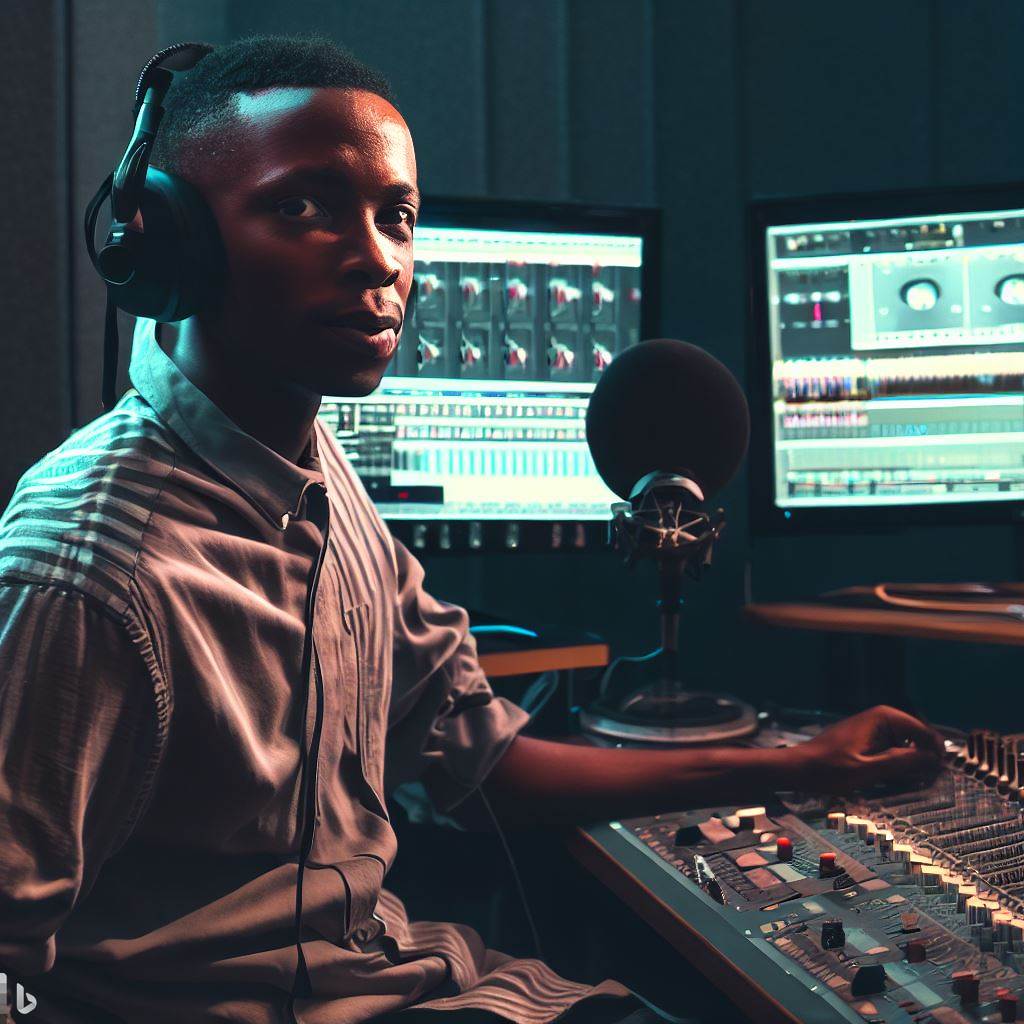Introduction
Interpreter and translator training institutions in Nigeria play a crucial role in developing professional language experts.
The importance of these institutions lies in bridging language and cultural gaps in various sectors.
In recent years, the field of interpretation and translation has witnessed significant growth and recognition.
There is a growing demand for skilled interpreters and translators to facilitate effective communication in diverse industries.
These training institutions equip students with the necessary linguistic and cultural competence to excel in their careers.
Moreover, they offer specialized programs that cater to different language combinations and subject areas.
The training provided focuses on enhancing interpretation and translation skills, including simultaneous and consecutive interpretation.
Cross-cultural communication and sensitivity are also emphasized to ensure effective communication between individuals from different backgrounds.
Interpreter and translator training institutions are not just limited to universities but also include language schools and professional associations.
These institutions provide a platform for aspiring language experts to gain theoretical knowledge and practical experience.
The graduates of these institutions have the potential to contribute significantly to the social, economic, and political development of Nigeria.
Therefore, the establishment and growth of interpreter and translator training institutions are vital for the nation’s progress.
Most importantly, interpreter and translator training institutions in Nigeria are crucial in fostering linguistic and cultural understanding.
They contribute to the professional development of language experts and promote effective communication in diverse industries.
Overview of Interpreter and Translator Training Institutions in Nigeria
Interpreter and Translator Training Institutions in Nigeria significantly contribute to cultivating proficient language professionals.
With the escalating global interactions, trade, and cultural engagement, these institutions address the mounting demand for skilled interpreters and translators.
The Institute of Chartered Translators and Interpreters of Nigeria (ICTIN) is a distinguished establishment in this domain.
It establishes professional benchmarks, provides competence-enhancing courses in languages like English, French, Spanish, Arabic, and Chinese, covering written translation and oral interpretation.
Another notable entity, the Nigerian Institute of Translators and Interpreters (NITI), strives to advance language services professionally.
NITI offers wide-ranging language programs, fostering diverse linguistic abilities.
Several Nigerian universities, including the University of Lagos, University of Ibadan, and Ahmadu Bello University, offer academic courses encompassing language theory, translation techniques, and cultural awareness.
Courses cater to various languages such as Yoruba, Hausa, and Igbo, with specializations like legal, medical, technical, and literary translation.
Hands-on experience, internships, and practical training prepare graduates effectively.
These institutions not only provide quality education but also networking opportunities and professional certifications, bolstering graduates’ standing in the competitive language services sector.
Overall, Nigeria’s interpreter and translator training institutions play a pivotal role in nurturing adept language professionals, supporting effective communication and cultural comprehension.
Importance of Certification and Accreditation
In the field of interpretation and translation, certification and accreditation play a crucial role in ensuring the competence and proficiency of professionals.
These credentials provide formal recognition of a translator or interpreter’s skills and knowledge, distinguishing them from non-certified individuals.
Let’s delve deeper into the importance of certification and accreditation in this profession.
A. Ensuring Quality and Reliability
Certification and accreditation serve as benchmarks for the quality and reliability of professional interpreters and translators.
These credentials demonstrate that individuals have undergone rigorous training and assessment, ensuring they possess the necessary language proficiency and cultural understanding to perform their job effectively.
- Certified professionals have demonstrated their competence in the linguistic and cultural aspects of translation and interpretation.
- Accredited institutions have strict standards for training and assessment, ensuring only qualified individuals receive accreditation.
- By hiring certified and accredited interpreters and translators, clients can have peace of mind knowing they are working with professionals who adhere to industry standards.
B. Enhancing Professional Credibility
Certification and accreditation enhance the credibility of interpreters and translators, both individually and as a profession.
These credentials validate their expertise and demonstrate their commitment to continuous professional development.
- With certification, professionals can prove their qualifications to potential employers or clients.
- Accreditation signifies that an interpreter or translator is part of a recognized and reputable professional organization.
- Certified professionals are more likely to earn the trust and respect of clients, leading to increased job opportunities and professional growth.
C. Gaining a Competitive Edge
In a competitive job market, certification and accreditation give interpreters and translators a distinct advantage.
These credentials set them apart from non-certified individuals, increasing their chances of securing desirable job opportunities.
- Many employers prefer to hire certified professionals as it ensures a certain level of expertise.
- Certification and accreditation demonstrate a commitment to excellence and ongoing professional development.
- With these credentials, professionals can showcase their skills and knowledge, giving them an edge over non-certified competitors.
D. Access to Professional Networks and Resources
Certification and accreditation often provide access to valuable professional networks and resources, further supporting interpreters and translators in their career advancement.
- Professional organizations that offer certification and accreditation provide networking opportunities with other certified professionals.
- Certified individuals may receive exclusive access to industry conferences, workshops, and continuing education programs.
- These networks and resources allow professionals to stay updated with industry trends and developments, improving their skills and knowledge.
In summary, certification and accreditation are crucial in the field of interpretation and translation.
These credentials ensure quality, enhance credibility, provide a competitive edge, and offer access to valuable professional networks and resources.
Aspiring interpreters and translators should consider pursuing certification and accreditation to establish themselves as qualified and competent professionals in this highly specialized field.
Top Interpreter and Translator Training Institutions in Nigeria
Translator and interpreter training in Nigeria is crucial for individuals interested in pursuing a career in language mediation.
These institutions provide quality training programs that equip students with the necessary skills and knowledge to excel in their profession.
This section will highlight the top interpreter and translator training institutions in Nigeria, discussing their reputation, faculty, facilities, and curriculum.
Institute of African Studies, University of Nigeria, Nsukka
- Renowned for its exceptional interpreter and translator training programs.
- Experienced faculty members who are experts in various languages and translation techniques.
- State-of-the-art facilities, including language laboratories and libraries.
- Offers a comprehensive curriculum that covers language proficiency, cultural studies, and practical training.
Nigerian Institute of Translators and Interpreters (NITI)
- Highly regarded institution specializing in translation and interpretation training.
- Faculty consists of industry professionals with extensive experience in language services.
- Equipped with modern facilities and resources to enhance student learning.
- Curriculum focuses on both theoretical and practical aspects of translation and interpretation.
University of Ibadan
- Well-known for its interpreter and translator training courses.
- Faculty comprises distinguished scholars and practitioners in the field of linguistics.
- Offers excellent facilities, including language laboratories and dedicated translation libraries.
- Curriculum emphasizes language proficiency, translation techniques, and cultural studies.
Department of Foreign Languages, University of Lagos
- Recognized for its rigorous interpreter and translator training programs.
- Faculty members are respected professionals in translation and interpretation.
- Provides students with access to modern technologies and resources for language learning.
- Focuses on developing practical translation and interpretation skills through hands-on training.
National Open University of Nigeria (NOUN)
- Offers comprehensive programs in translation and interpretation.
- Faculty consists of experienced linguists and industry practitioners.
- Provides a flexible learning environment through distance education.
- Curriculum covers various types of translation, interpreter ethics, and cultural adaptation.
Center for Translation and Interpretation, University of Port Harcourt
- Prominent institution offering interpreter and translator training programs.
- Faculty includes renowned experts in translation and interpretation.
- Equipped with modern amenities, including language laboratories and multimedia classrooms.
- Curriculum focuses on practical training, linguistic analysis, and cultural adaptation.
These top interpreter and translator training institutions in Nigeria have built a reputation for their commitment to providing high-quality education in language mediation.
Their experienced faculty, state-of-the-art facilities, and comprehensive curriculum ensure that students receive a holistic learning experience.
Whether individuals aspire to work as interpreters or translators in government, business, or international organizations, these institutions offer the necessary foundation for a successful career in the field.
Invest in your future by choosing one of these esteemed institutions to kickstart your journey in interpreter and translator training.

University of Lagos
The University of Lagos is one of the top institutions in Nigeria that offers interpreter and translator training programs.
With a strong focus on language proficiency and cultural understanding, their program prepares students for a successful career in the field.
Interpreter and Translator Training Program
- The University of Lagos offers a Bachelor of Arts in French, which includes extensive training in interpretation and translation.
- Students are exposed to various aspects of language, including grammar, vocabulary, literature, and cultural nuances.
- The program emphasizes both written and oral communication skills, ensuring that students are well-rounded professionals.
- In addition to French, they also offer courses in Portuguese, Arabic, German, Spanish, and Chinese.
- These language courses provide students with a wider range of expertise, enabling them to work in multiple language pairs.
Specializations and Unique Features
- The University of Lagos allows students to specialize in specific fields such as legal, medical, and technical translation.
- Specialized training equips graduates with the necessary terminology and knowledge required for these specialized industries.
- They also have partnerships with international universities, offering students opportunities for exchange programs.
- These programs provide invaluable experiences in different cultural contexts, enhancing students’ understanding of language diversity.
Notable Alumni and Success Stories
Over the years, the University of Lagos has produced several successful interpreters and translators who have excelled in their careers:
- John Okoro – He graduated from the program and now works as a freelance interpreter for the United Nations.
- Amina Mohammed – She specialized in legal translation and now serves as a highly sought-after court interpreter.
- Chinedu Okafor – After completing the program, he established his translation agency and has worked with numerous multinational corporations.
These alumni serve as inspiration for current students, showcasing the potential for success in the field of interpretation and translation after completing the program at the University of Lagos.
In the end, the University of Lagos stands out as a top institution in Nigeria for interpreter and translator training.
With a comprehensive program, specialized options, and notable alumni, it offers students an excellent foundation for a rewarding career in the language industry.
Read: Sound Editing: Nigeria Versus the Global Scene
Nigerian Institute of Translators and Interpreters (NITI)
The Nigerian Institute of Translators and Interpreters (NITI) is among Nigeria’s premier interpreter and translator training institutions.
It offers comprehensive programs to cultivate skilled professionals in this field.
NITI’s training covers diverse aspects of translation and interpretation, providing essential skills for industry success.
It offers courses in translation theory, simultaneous and consecutive interpretation, language proficiency, and specialized areas like legal, medical, and technical translation.
NITI emphasizes continuous professional growth through workshops, seminars, and conferences led by experts. These events enable participants to stay updated with industry trends.
Collaborating with universities, government bodies, and international organizations enhances NITI’s training quality. These partnerships offer broader perspectives and enrich the learning journey.
NITI’s membership grants access to a vast professional network, fostering career development and connections. Certified by NITI, professionals gain industry recognition, credibility, and job opportunities.
Joining NITI fuels personal and professional growth with ongoing guidance, resources, and training. It excels as Nigeria’s choice for top-notch interpreter and translator training.
Read: Prospects and Challenges: The Interpreter Role in Nigeria
Institute of African Studies, University of Ibadan
The Institute of African Studies, University of Ibadan, is one of the top training institutions for interpreters and translators in Nigeria.
Here is a closer look at the opportunities available at this renowned institute.
Interpreter and Translator Training Opportunities
At the Institute of African Studies, prospective interpreters and translators have access to comprehensive training programs.
These programs are designed to equip students with the necessary skills and knowledge to excel in the field.
The institute offers undergraduate and postgraduate degrees in African Languages and Translation Studies.
Students can choose from a range of specialized courses – from linguistics and literature to cultural studies and translation techniques.
The undergraduate program provides a solid foundation in language proficiency, theory of translation, and cross-cultural communication.
Students are exposed to various African languages, enabling them to develop fluency in at least one language of their choice.
For postgraduate students, the institute offers advanced courses that delve deeper into translation theory and practice.
These courses are tailored to meet the specific needs and professional goals of aspiring interpreters and translators.
Focus on African Languages and Cultural Understanding
What sets the Institute of African Studies apart is its focus on African languages and cultural understanding.
The institute recognizes the importance of preserving and promoting African languages, as well as fostering a deeper understanding of African cultures.
Through its language programs, the institute aims to revitalize indigenous African languages that are often neglected in formal education.
By offering training in these languages, the institute contributes to preserving linguistic diversity and promoting cultural heritage.
Furthermore, the institute emphasizes the role of interpretation and translation in bridging cultural gaps and promoting intercultural dialogue.
Students are taught not only the technical aspects of translation but also the cultural nuances that shape communication in different African contexts.
Research and Projects in Interpretation and Translation
The Institute of African Studies has a dedicated research unit focused on interpretation and translation.
This unit facilitates research and projects that contribute to the advancement of the field.
The institute collaborates with scholars, practitioners, and organizations to conduct research on various aspects of interpretation and translation.
This research covers topics such as language policy, translation strategies, cultural adaptation, and the impact of interpretation on public discourse.
In addition to research, the institute actively engages in projects that promote the use of African languages in official and informal settings.
These projects aim to demonstrate the relevance and effectiveness of translation in facilitating communication and fostering unity in diverse African societies.
All in all, the Institute of African Studies at the University of Ibadan offers excellent training opportunities for aspiring interpreters and translators.
With its focus on African languages, cultural understanding, and active research involvement, the institute prepares students to excel in the dynamic field of interpretation and translation.
Read: Understanding Music Rights Management in Nigeria
Comparative Analysis of Training Programs
When it comes to interpreter and translator training in Nigeria, there are several top institutions that stand out.
In this blog post, we will conduct a comparative analysis of their training programs, highlight their strengths and weaknesses, discuss their curriculum and duration of training, and mention any internship or job placement opportunities they offer.
Nigerian Institute of Translations and Interpretation (NITI)
- NITI offers a comprehensive training program that covers both interpretation and translation skills.
- The institution has highly qualified and experienced instructors who provide practical exposure and hands-on training.
- Students at NITI benefit from a well-structured curriculum that focuses on a wide range of language pairs.
- However, the duration of training at NITI is relatively long, spanning over two years.
- Internship opportunities are provided to students, enabling them to gain real-world experience.
Language Bridge Institute (LBI)
- LBI stands out for its intensive training programs that emphasize simultaneous interpretation.
- Students at LBI receive practical exposure through interactive sessions and mock interpretation exercises.
- The duration of the training program at LBI is relatively shorter, typically lasting one year.
- However, LBI primarily focuses on interpretation skills and provides limited training in translation.
- The institution offers job placement assistance to its graduates, ensuring better career prospects.
National Institute for Nigerian Languages (NINLAN)
- NINLAN provides a holistic training program that covers various aspects of language interpretation and translation.
- The curriculum at NINLAN is well-designed and includes practical modules to enhance students’ skills.
- Training at NINLAN usually lasts for two years, allowing students to develop a strong foundation.
- However, NINLAN lacks extensive practical exposure opportunities, which can be a drawback.
- The institution collaborates with government agencies and NGOs to offer internship opportunities to its students.
Center for Language Documentation and Translation Studies (CELADOTS)
- CELADOTS offers specialized training programs focused on language documentation and translation studies.
- The institution provides a well-structured curriculum that incorporates the latest techniques in translation.
- The duration of training at CELADOTS varies depending on the specific program, ranging from six months to one year.
- CELADOTS has limited internship opportunities, which may hinder practical exposure for students.
- However, the institution has a strong network with language service providers, facilitating potential job placements for graduates.
In short, choosing the right training institution for interpreter and translator programs in Nigeria requires careful consideration.
Each institution has its own strengths and weaknesses. NITI offers a comprehensive program, LBI emphasizes simultaneous interpretation, NINLAN provides a holistic approach, and CELADOTS focuses on language documentation.
Students must evaluate their personal preferences and career goals to make an informed decision.
Read: Career Path: How To Be A Professional Translator in Nigeria
Delve into the Subject: Income Expectations for Performers’ Agents in Nigeria
Success Stories and Testimonials
Completing a training program in one of the top interpreter and translator training institutions in Nigeria can be a stepping stone to success in the language services industry.
Here, we will share some success stories of individuals who have completed these training programs and the impact it has had on their careers.
Josephine Olaoluwa, a graduate of the translation program at the University of Lagos, is now working as a freelance translator for international organizations.
She credits the rigorous training she received at the institution for honing her linguistic skills and giving her the confidence to work with clients from different countries.
Similarly, Michael Okon, a graduate of the interpreter training program at the Nigerian Institute of Translators and Interpreters, has gone on to work as an interpreter for the United Nations.
The practical training he received during the program prepared him for real-life interpreting challenges, and he has since been recognized for his exceptional language skills.
Highlight their career achievements and how the training contributed to their success
Both Josephine and Michael’s success can be attributed to the quality of education and training they received at these top institutions.
The curriculum in these programs covers a wide range of skills necessary for success in the industry, including language proficiency, cultural understanding, and interpreting techniques.
The top interpreter and translator training institutions in Nigeria also provide students with opportunities to gain practical experience through internships and industry partnerships.
This exposure allows students to apply their knowledge in real-world settings, building their confidence and preparing them for the challenges they will face in their careers.
Include testimonials from professionals in the industry praising the quality of education provided
Professionals in the language services industry have praised the top interpreter and translator training institutions in Nigeria for their commitment to providing high-quality education.
Adeola Akintola, a renowned interpreter, states, “The training programs offered by these institutions are comprehensive and provide students with a solid foundation in interpreting and translation.”
Another professional, Chinedu Eze, adds, “The graduates from these institutions are well-trained and equipped to handle complex translation and interpreting assignments.
They possess a deep understanding of the nuances of various languages and cultures.”
These testimonials further confirm the excellence in education and training provided by the top interpreter and translator training institutions in Nigeria.
The success stories and recognition from professionals in the industry serve as strong endorsements for prospective students considering pursuing a career in interpreting and translation in Nigeria.
Conclusion
Interpreter and translator training institutions play a crucial role in Nigeria’s language industry. They equip aspiring professionals with the necessary skills and knowledge to excel in this field.
If you aspire to become an interpreter or translator, consider enrolling in reputable training programs offered by these institutions.
They provide comprehensive courses and practical experiences to prepare you for a successful career.
In summary, interpreter and translator training institutions are the gateway to a thriving career in Nigeria’s interpretation and translation industry.
The demand for language professionals is growing rapidly, and by enrolling in these programs, you can be part of this rewarding and fulfilling field.
Don’t miss out on the opportunity to make a difference through language.
Take action and invest in your future by pursuing a career in interpretation and translation in Nigeria.




